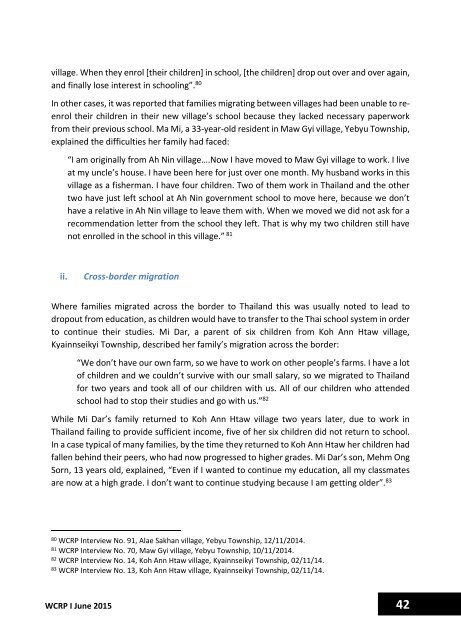Final-Edition
Final-Edition
Final-Edition
Create successful ePaper yourself
Turn your PDF publications into a flip-book with our unique Google optimized e-Paper software.
village. When they enrol [their children] in school, [the children] drop out over and over again,<br />
and finally lose interest in schooling”. 80<br />
In other cases, it was reported that families migrating between villages had been unable to reenrol<br />
their children in their new village’s school because they lacked necessary paperwork<br />
from their previous school. Ma Mi, a 33-year-old resident in Maw Gyi village, Yebyu Township,<br />
explained the difficulties her family had faced:<br />
“I am originally from Ah Nin village….Now I have moved to Maw Gyi village to work. I live<br />
at my uncle’s house. I have been here for just over one month. My husband works in this<br />
village as a fisherman. I have four children. Two of them work in Thailand and the other<br />
two have just left school at Ah Nin government school to move here, because we don’t<br />
have a relative in Ah Nin village to leave them with. When we moved we did not ask for a<br />
recommendation letter from the school they left. That is why my two children still have<br />
not enrolled in the school in this village.” 81<br />
ii.<br />
Cross-border migration<br />
Where families migrated across the border to Thailand this was usually noted to lead to<br />
dropout from education, as children would have to transfer to the Thai school system in order<br />
to continue their studies. Mi Dar, a parent of six children from Koh Ann Htaw village,<br />
Kyainnseikyi Township, described her family’s migration across the border:<br />
“We don’t have our own farm, so we have to work on other people’s farms. I have a lot<br />
of children and we couldn’t survive with our small salary, so we migrated to Thailand<br />
for two years and took all of our children with us. All of our children who attended<br />
school had to stop their studies and go with us.” 82<br />
While Mi Dar’s family returned to Koh Ann Htaw village two years later, due to work in<br />
Thailand failing to provide sufficient income, five of her six children did not return to school.<br />
In a case typical of many families, by the time they returned to Koh Ann Htaw her children had<br />
fallen behind their peers, who had now progressed to higher grades. Mi Dar’s son, Mehm Ong<br />
Sorn, 13 years old, explained, “Even if I wanted to continue my education, all my classmates<br />
are now at a high grade. I don’t want to continue studying because I am getting older”. 83<br />
80<br />
WCRP Interview No. 91, Alae Sakhan village, Yebyu Township, 12/11/2014.<br />
81<br />
WCRP Interview No. 70, Maw Gyi village, Yebyu Township, 10/11/2014.<br />
82<br />
WCRP Interview No. 14, Koh Ann Htaw village, Kyainnseikyi Township, 02/11/14.<br />
83<br />
WCRP Interview No. 13, Koh Ann Htaw village, Kyainnseikyi Township, 02/11/14.<br />
WCRP Ι June 2015<br />
42


